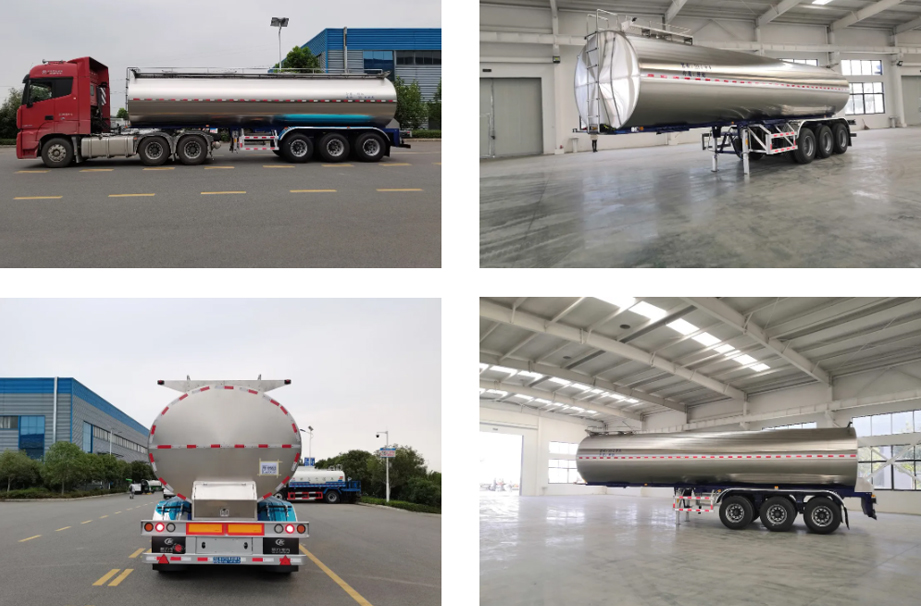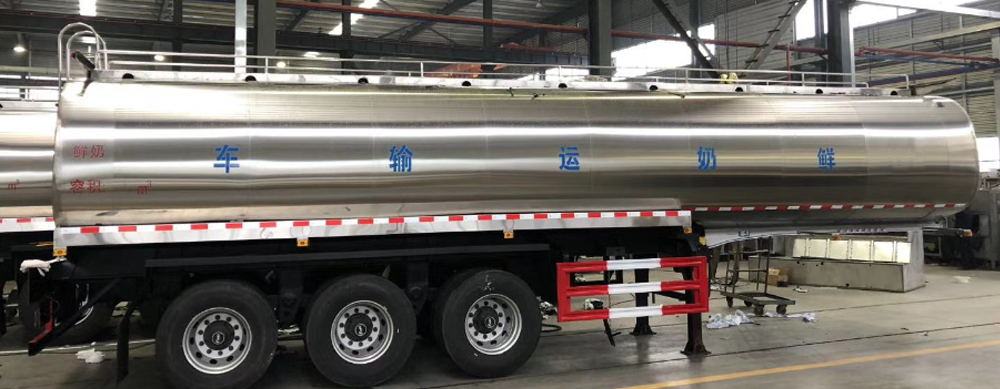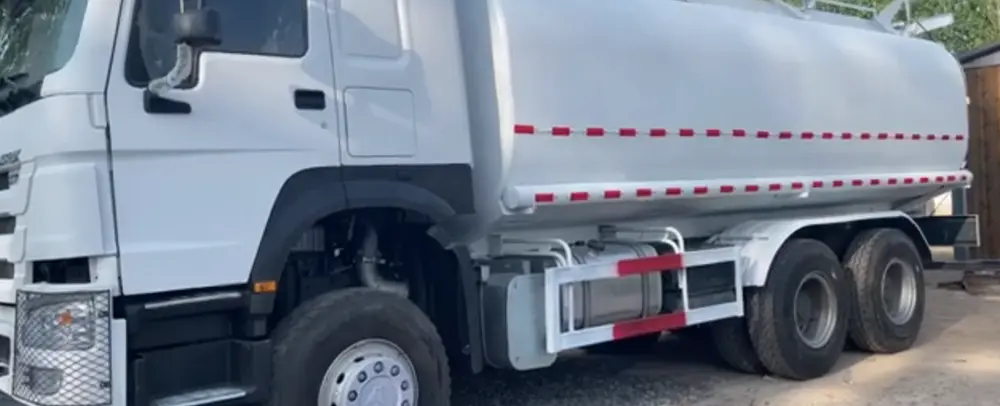Milk tank trucks are specialized vehicles designed to transport milk safely and efficiently from dairy farms to processing plants or distribution centers.
Milk tank trucks are typically large, boxy vehicles with a cylindrical tank mounted on the chassis. The tank is made of stainless steel, a material that is highly resistant to corrosion and easy to clean. This is essential as milk is a perishable product that can easily spoil if exposed to contaminants.
The exterior of the truck is usually painted white or a light color to reflect sunlight and keep the milk inside cool. Some milk tank trucks may also have insulation on the tank to further maintain a consistent temperature.
| Basic Information | ||||
| Drive Type | 6X2 | 4X2 | 6X4 | 8X4 |
| Wheelbase | 1900+4700mm | 5300mm | 4800+1350mm | 1900+3800+1350mm |
| Dimensions | 10.05×2.495×3.3m | 8.52×2.55×3.34m | 9.64×2.55×3.64m | 11.15×2.55×3.6m |
| Front/Rear Suspension | 1.4/2.05m | 1.4/2.42m | 1.4/2.59m | 1.4/2.7m |
| Rated load | 14.815 tons | 10.36 tons | 15.16 tons | 19.77 tons |
| Total Masses | 25 tons | 18 tons | 26 tons | 32 tons |
| Maximum speed | 98km/h | 79km/h | 79km/h | 79km/h |
| Front wheelbase/ rear wheelbase | Front: 1952/1952mm; Rear: 1860mm | 1950/1878mm | 1988/1878/1878mm | Front: 1950/1950mm; Rear: 1878/1878mm |
| Engine parameters | ||||
| Engine Model | Dachai CA6DK1-24E5 | Dachai CA4DK1-22E62 | Dachai CA6DK1-28E61 | Dachai CA6DK1-32E61 |
| Number of cylinders | 6-cylinder | 4-cylinder | 6-cylinder | 6-cylinder |
| Maximum power output | 180kW | 165kW | 209kW | 239kW |
| Maximum Horsepower | 240 hp | 220 hp | 280 hp | 320 hp |
| Displacements | 7.146L | 4.764L | 7.2L | 7.2L |
| Emission standard | National V | National VI | National VI | National VI |
| Transmission parameters | ||||
| Transmission Model | FAW Jiefang 8-speed | FAW Jiefang CA8TAX090F | FAW Jiefang CA10TA130M | FAW Jiefang CCA10TAX130S |
| Number of gears | 8-speed | 8-speed | 10-speed | 10-speed |
| Chassis parameters | ||||
| Chassis Brands | FAW Jiefang | FAW Jiefang | FAW Jiefang | FAW Jiefang |
| Chassis Model | CA1250P62K1L7T3E5 | CA5180GYYP62K1L5E6 | CA5260GYYP62K1L3T1E6 | CA5320GYYP62K1L6T4E6 |
| Tires | ||||
| Number of tires | 8 | 6 | 10 | 12 |
| Tire size | 12R22.5 | 11R22.5 18PR | 12R22.5 | 12R22.5 18PR |
The main frame and components of a milk tank truck include the following:

1. Frame
Chassis: The chassis provides the basic support and structure for the milk tank truck.
Suspension System: It is responsible for reducing the impact and vibration during driving, ensuring a smooth ride.
2. Tank
Tank Body: The tank body is usually made of food-grade stainless steel to ensure the hygiene and safety of the milk.
Insulation Layer: Its main function is to maintain the temperature of the milk, preventing the milk from deteriorating due to temperature changes.
Outer Layer (Insulation Layer Protector): The outer layer of the tank is a protective layer for the insulation layer, which is usually made of 2mm thick 304L stainless steel.
3. Temperature Control System
Refrigeration Unit: The refrigeration unit can cool the milk to the required temperature, ensuring its freshness and quality.
Temperature Sensor and Controller: Temperature sensors are installed inside the tank to monitor the temperature of the milk in real time.
4. Pumping and Loading/Unloading System
Pump: The pump is used to transfer the milk between the milk tank truck and the storage tank at the milk source or the receiving facility.
Hoses and Couplings: Hoses and couplings are used to connect the milk tank truck with the storage tank.
5. Cleaning System
CIP (Clean-In-Place) System: It can automatically clean the interior of the tank without disassembling the tank, saving time and labor.
Cleaning Nozzles: Cleaning nozzles are installed inside the tank to ensure that the cleaning solution can reach every corner of the tank, achieving thorough cleaning.
6. Safety Devices
Vent Valve: The vent valve is set on the top of the tank to automatically adjust the pressure inside the tank, reducing the evaporation loss of the liquid and preventing the tank from deforming due to positive or negative pressure.
Static Grounding Disk: To prevent electrostatic sparks from causing accidents, a static grounding disk is installed on the milk tank truck to discharge static electricity.
Fire Shield: A fire shield is added to prevent unexpected traffic accidents caused by static electricity or sparks.
When choosing the right milk tank trucks, the following factors need to be considered:

1. Capacity
The capacity of the milk tank truck should match your transportation needs.
2. Material and Construction Quality of the Tank
The tank is usually made of stainless steel. High-quality stainless steel (such as 304 or 316L stainless steel) is preferred as it is corrosion-resistant, which is crucial for maintaining the purity and quality of milk.
3. Temperature Control System
Milk needs to be transported at a specific temperature range (usually around 2 - 4°C) to maintain its freshness and quality. A good milk tank truck should be equipped with an efficient refrigeration unit. The refrigeration system should have accurate temperature sensors and controls to ensure that the temperature inside the tank remains stable.
4. Hygiene and Sanitation Features
Easy-to-clean design is essential. The tank should have manholes and access points that allow for thorough cleaning of the interior.
5. Pumping and Loading/Unloading Systems
The pumping system should be able to transfer milk quickly and efficiently. The pump should have the appropriate flow rate and pressure to handle the viscosity of milk. Loading and unloading systems should be designed to be compatible with the dairy farm's storage tanks and the receiving facility's infrastructure.
6. Mobility and Vehicle Specifications
Consider the power and performance of the truck's chassis. A powerful engine is needed to handle the weight of the full milk tank and to ensure reliable transportation, especially in hilly or difficult terrains.
7. Compliance with Regulations
The milk tank truck must comply with local and national transportation, food safety, and environmental regulations.
8. Cost and Maintenance
A truck with a more reliable and durable construction and components may have a higher initial cost but could save you money in the long run through reduced repair and replacement costs. Spare parts availability and the ease of maintenance (such as how accessible the engine and other key components are for servicing) are also important factors to consider.

Milk tank trucks are typically made of stainless steel.
Milk tank trucks come in various capacities.
A powerful refrigeration unit is installed on the milk tank truck.
There are advanced temperature-monitoring systems in place.
Milk tank trucks are equipped with a CIP system.
The cleaning cycle is automated and can be programmed to meet specific cleaning requirements.
All the fittings and valves on the milk tank truck are designed with hygiene in mind.
The truck's suspension system is designed to handle the heavy weight of the milk tank when it's full.
Milk tank trucks are equipped with standard safety equipment such as emergency brakes, reflective markings, and warning lights.

